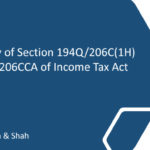Income Tax regulations for foreign nationals/expatriates working in India
- Pathik Shah
- June 28, 2021
- Income Tax Regulations for Foreign Nationals

Income Tax regulations for foreign nationals/expatriates working in India
India is an attractive destination for foreign nationals intending to work in the country, so knowing about Income Tax Regulations for Foreign Nationals is a must. The main attractions include the diversity in people, languages, culture, food, and the vibrancy of the country. The lower living costs and the incentives available to families are the key factors that contribute to a good quality of life, and hence, expatriates like to work in India. Another great benefit of working in India is that since English is one of the official languages, it is easier to live in the country for foreigners who know English.
However, there are few cons of living in India because it is a lot different from any western country and hence far off from the expectations of an expat. One of the disadvantages is the long working hours in India as compared to the global average. The InterNations’ Expat Insider 2018 survey reported a global average weekly working hour of 44.0 hours, while in India, it was recorded as 48.2 hours. Some of the other drawbacks include poor education options, lesser options for leisure, and restricted accessibility of digital life.
Nonetheless, the most critical areas, which expatriates need to understand, are the taxation rules and related regulatory provisions. It is better for expatriates to hire professional advice and guidance for understanding the tax compliances, consequences, and other related procedures and obligations. However, below is an overview of the basic concepts and regulations that exist for expatriates or foreign nationals seeking to work in India.
Defining tax resident
The income tax amount that an expatriate is liable to pay is dependent on his/her residential status in a fiscal year. The fiscal year in India runs from April 1 to March 31 of any year. An individual is considered to be a tax-resident in India in a fiscal year if he/she is in India for 182 days or more in the tax year or 60 days or more in a tax year and 365 days or more in the immediately preceding four years. If both of these conditions are not satisfied, then the individual is called a non-resident. A non-resident is taxed only for the income sourced in India or received in India.
Other than the basic conditions, there are advanced conditions to classify the residents as ROR (Resident and ordinarily resident) and RNOR (Resident and not ordinarily resident). If the individual has been a non-resident in nine out of the 10 preceding tax years or has been in India for 729 days or less during the preceding seven tax years, then he/she is considered to be an RNOR. If none of these conditions are satisfied, then the individual is a ROR. While the ROR is taxed on worldwide income, the RNOR is taxed on the income received or sourced in India. An expatriate arriving in India for the first time remains a non-resident or RNOR for the first two fiscal years.
However, if there exists a DTAA (Double Tax Avoidance Agreement) between India and the home country of the expatriate, the DTAA provisions will be applicable and not the Indian tax laws. Some rules may lead to an expatriate considered a resident of both the home country and deported country, thereby leading to the ‘Rule of Tie-Breaker,’ under which different factors are considered for defining the tax residence in the following order:
Permanent home:
The country in which the expatriate has a permanent home
Centre of vital interest
The country with which the expatriate has closer social and economic ties
Longer duration of residence
The country where the expatriate has a longer duration of residence
Nationality
The country whose nationality he/she holds
Competent authorities
The country decided by the mutual agreement between the competent authorities of both the countries
Tax registration number
Tax rates
- With the taxable income of less than INR 2,50,000.0 – There is no tax
- Taxable income ranging from INR 2,50,000.0 to INR 5,00,000.0 – The tax rate is 5%
- Taxable income ranging from INR 5,00,000.0 to INR 10,00,000.0 – The tax rate is 20%
- Taxable income higher than INR 10,00,000.0 – The tax rate is 30%
In addition to salary, employees receive benefits called perquisites due to which the taxable income increases. There are rules for each of the perquisites provided by the employer including motorcar, free or concessional educational facilities, meals, club memberships, residential accommodations, utilities, free or concessional travel, gifts, vouchers, tokens, ad help of sweeper, gardener, security or domestic work, and interest-free loans. Medical facilities and mobile phone usage for business purposes are exempt from tax. The non-employment income is taxed at different rates depending on the type of income. The non-employment income includes interest earned, royalties payable, and long-term and short-term capital gains earned on the disposal of capital assets located in India.
Tax implication of various components of compensation of employees
- Basic salary
- Bonus or commission
- Utilities (electricity, water, servants)
- Children’s education
- Tax borne by the employer
- Allowances such as living allowance, hardship allowance
There are some components as follows, which are taxed on a concessional value:
- House Rentallowance
- Rent-free accommodation
- Furniture provided by the employer
- Temporary accommodation on transfer
Social security benefits
If no such SSA exists, then the expatriate is required to make the required contributions, and the employer company must contribute its part of the amount. Under the provisions of the PF scheme, both the employee and the employer contribute 12% of the monthly pay; this monthly pay is the total salary whether received in India or abroad. Of the 12% contributed by the employer, 8.33% is towards the Pension Fund while the balance 3.67% is towards the Provident Fund.
The expatriate can withdraw the pension after attaining the age of 58 years, provided the necessary conditions are satisfied. In the case of PF, the expatriate can withdraw the amount after attaining the age of 58 years or if the individual is retiring because of permanent incapacitation, as verified by a medical practitioner.
Daily allowances
- Prepare and submit a statement of daily expenses incurred for the entire duration of stay in India
- Submit the proofs of such expenses with the bills, receipts, invoices, etc
Employees Stock Option Plans (ESOPs)
Professional tax
Tax return filing
- Movable and immovable assets held overseas
- Financial interest or signing authority in any other country
- Trusteeship in offshore trusts
Regulations for foreign exchange and remittance of funds
Income Tax Clearance Certificate (ITCC)
At the time of departing India for the last time as an expatriate, individuals are mandated to submit the ITCC (Income Tax Clearance Certificate) to the immigration officials. The Income Tax authorities provide this certificate to the expatriate, thereby certifying that the individual has no pending tax dues or tax liabilities in India.
The expatriates coming to India must be careful of these regulations and rules, and the employers must provide the required guidance and support prior to expatriates’ deportation to the country.



